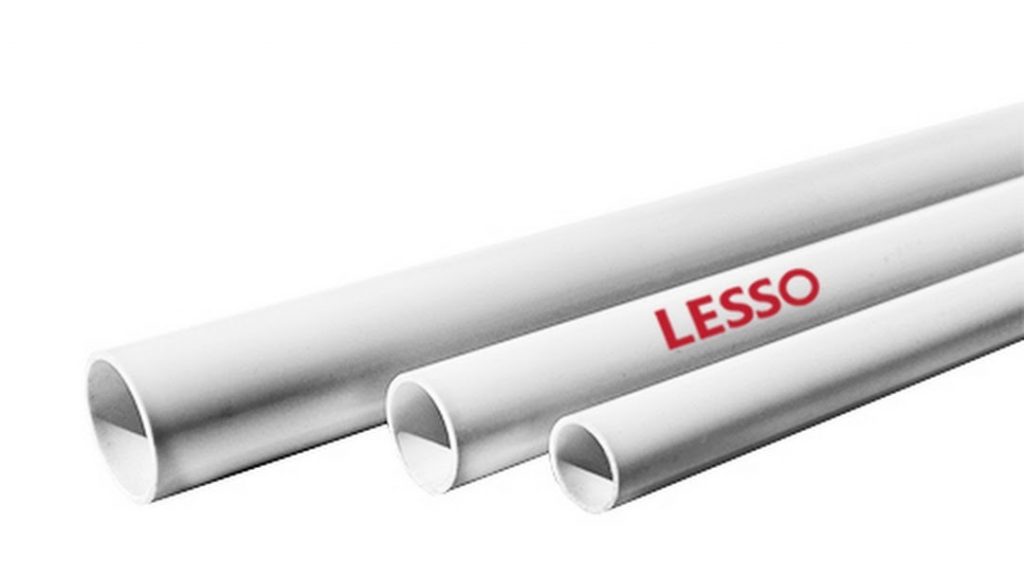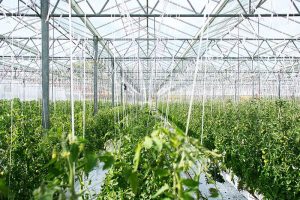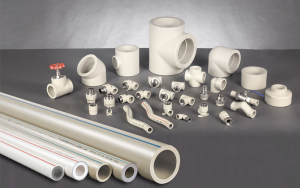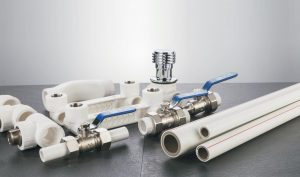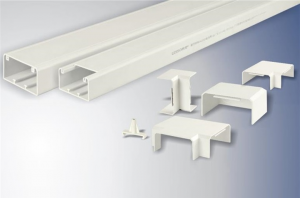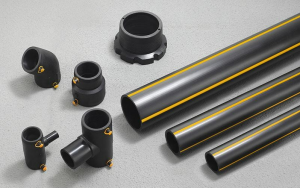Why are PVC pipes so popular? PVC pipes are largely used because of their strength, durability, and corrosive-resistant features. This makes them well-suited for residential, commercial, agricultural, and municipal engineering purposes.
Our Lesso PVC pipes have no heavy metal additives, have a high-flow capacity, are environmentally friendly, and have low installation costs. They can be recycled, too. Here are some more details you should know about PVC pipes, why they stand out, and their lifespan.
The History of PVC Pipes
Before PVC pipes were introduced in the 1960s, the United States relied on materials like iron, steel, and steel-reinforced concrete for its pipes. When PVC emerged, the National Sanitation Foundation was tasked with determining how suitable these pipes were for potable water systems.
Once it was deemed safe, its spread became rapid. By 1985, 750,000 miles of PVC rural water pipe had been installed in the U.S., and by 1996, PVC pipes had become the number one water pipe in the U.S. The explosion of PVC pipes isn’t accidental. They offer tremendous benefits. We’ll expand on those benefits below.
More on the PVC Pipe Lifespan
How long will PVC pipe last underground? The lifespan of PVC pipes is estimated to be around 100 years, though this isn’t an exact figure because PVC pipes have only been used in the U.S. since the 1960s. What contributes to a long lifespan, however, is the material’s chemical stability and the fact that it is resistant to corrosion.
PVC (polyvinyl chloride) is made from chlorine and ethylene. Because of its plastic materials, it is immune to corrosion and resistant to degradation caused by organic substances, salts, acids, bases, or a variety of other chemicals. As a result, PVC pipes can be exposed to different elements in soil and water and remain intact.
Another reason the PVC pipe lifespan is long is because, unlike metal pipes, they are resistant to biological growth, such as bacteria and algae. This makes them suitable for sewer and wastewater systems. Finally, PVC pipes are designed to be durable and strong, allowing them to withstand a lot of external pressure.
What Factors Can Reduce the PVC Pipe Lifespan?
Although PVC pipes are known for their strength and durability, there are factors that can reduce their longevity.
Sun Exposure: Is PVC UV Resistant?
Unfortunately, PVC pipes are not UV resistant, and the sun’s ultraviolet rays can break down PVC pipes faster than normal. Some of the damage from ultraviolet rays is degradation. There will be signs of discoloration, and the pipes may become brittle.
In addition, over time, the pipes may develop small cracks on the surface and eventually lose their strength. To reduce the damage from ultraviolet rays, PVC pipes used outdoors can be painted with latex-based paint or covered. While these measures can slow the degradation from UV rays, they may not prevent it completely.
Poor Installation
To get the most out of your PVC pipes, you will need a professional installation. Although that’s true of any appliance or plumbing system, PVC pipes can be especially vulnerable. Proper bedding, for example, is crucial to ensure the pipes are aligned correctly and that they have enough support.
Plumbers may also make an error with the PVC cement. If they use too much PVC cement, the pipes could break down. And, if they use too little PVC cement, the bonds may break. “Short insertion” can pose a major problem, too. If the PVC pipes have not been joined or fitted properly, there may be leaks.
Underground Challenges and How Long Will PVC Pipe Last Underground?
When the ground freezes, then contracts and eventually thaws, the soil shifts, contracting and expanding as well. This phenomenon, known as “soil heaving” can cause PVC pipes to crack or break completely.
There is also the issue of underground debris. Rocks, tree roots, and other forms of debris rubbing up against the pipes can cause friction, which can – over time – weaken the pipes. One way to prevent this is to add enough backfill material in order to insulate the pipes. A second way to secure underground PVC pipes is to add proper bedding. This can help with alignment and stability.
Ensuring PVC Pipe Durability
To maximize your PVC pipe lifespan, it’s important to pay attention to three different factors. These include:
Proper Installation and Maintenance
Proper installation is key, of course, when it comes to ensuring how durable your PVC pipe system is. When the pipes are fitted correctly, the risks of leaks are significantly reduced. They can also withstand different types of pressures without collapsing or deforming. And as noted before, proper backfilling and bedding can better insulate the pipes and stabilize them.
Regular maintenance is crucial, too. Have plumbers perform a regular inspection to ensure there are no blockages, cracks, or leaks. For pipes that are above ground, plumbers can add another layer of paint to protect against UV rays, or they can ensure the pipes are always covered.
Debris Removal, Proper Bonding, and Water Velocity
To keep your PVC pipes in good working order, try to prevent debris from entering them in the first place. However, this isn’t always possible. To remove debris, you can flush warm water down your pipes.
Proper bonding with PVC cement is critical if you need durable PVC pipes that won’t leak or break unexpectedly. Different PVC pipes use different PVC cement. After bonding, professional plumbers should perform a leak and pressure test to ensure you have a leak-proof, air-tight bond.
Consider water velocity as well when ensuring strong PVC pipes. Some PVC pipe systems are designed for high or low-water applications. Depending on the water velocity, plumbers may need to add diffusers or flow restrictors to help reduce the impact of the water velocity.
Correct Pipe Size
Finally, choosing the correct pipe size can ensure your PVC pipe lasts longer. If the diameter of the pipe is too small, there will be flow restrictions. If the diameter is too large, there will be a reduction in flow velocity. This may cause sediment buildup.
The correct-size pipes will also prevent the interior of your pipes from eroding. Excessive water velocity can result in more wear and tear on your pipes and faster degradation. “Water hammer” can also become an issue. Water hammer occurs when the flow of water suddenly stops or is forced to change direction. This creates immediate pressure within the pipes, which can cause them to crack or burst.
Strength and Advantages of PVC Pipes
PVC pipes are durable, reliable, and strong. Because of their inherent rigidity, they can withstand a variety of pressures. Their durability allows them to withstand internal pressures without collapsing. And their track record ensures you will be getting a reliable pipe system.
There are also advantages. When you choose our PVC pipes, you will get low installation costs and environmentally friendly pipes that can be recycled. And because they don’t conduct electricity, they won’t be affected by electrochemical reactions caused by acids, salts, and bases that can corrode metals.
Conclusion
PVC pipes can last for 50 years or longer if they are installed and maintained correctly. It’s important to hire professional plumbers, however, to ensure proper bonding, proper backfilling, and professional bedding. To extend the lifespan of your pipes, keep your pipes clean and have plumbers perform regular inspectleions. This will give you durable, reliable, and strong pipes that can last a lifetime.
Need high-quality PVC pipes? Contact us today to find out more about our Lesso products.
FAQs about Sewer Pipe
PVC pipes offer some flexibility, making them more resilient to ground movement compared to rigid pipe materials like concrete or iron. However, proper installation and anchoring are crucial for optimal performance in earthquake-prone areas.
Standard PVC pipes have a maximum operating temperature of around 140°F (60°C). For hot water applications, CPVC is generally recommended due to its higher temperature resistance.
PVC is generally compatible with other materials like metal and concrete. However, when connecting PVC to other materials, it’s important to use the appropriate type of joint or adapter to ensure a secure and leak-free connection.
Recommend Reading
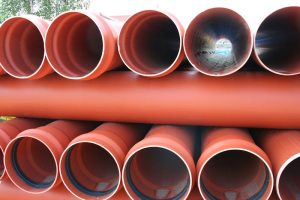

PVC vs ABS vs PEX: The Ultimate Guide to Sewer Line Materials
Table of Contents The sewer line materials you select for your residential plumbing upgrade, home improvement project, or piping repairs should be of the highest
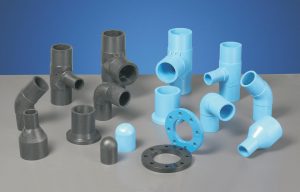

Applications of PE Pipe
Table of Contents The requirement for high-quality pipes in water and gas distribution, submerged marines, and other systems means that PE piping’s use will only


